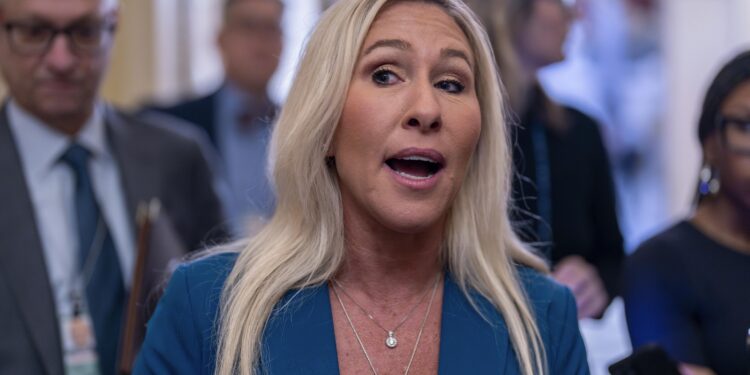Rep. Marjorie Taylor Greene Opts Out of Senate Race, Shifting Republican Landscape
In an unexpected turn of events, Representative Marjorie Taylor Greene has declared that she will not be pursuing the U.S. Senate seat from Georgia in the forthcoming election cycle. Known for her provocative opinions and advocacy for far-right initiatives, Greene made this announcement during a recent interview, citing personal reasons and her dedication to her current responsibilities in the House of Representatives. This decision has ignited conversations among political commentators and supporters alike, who are now pondering its potential effects on Georgia’s Republican scene as the election season approaches.
Greene Exits Senate Race: Republican Strategies in Flux
The announcement from Rep. Marjorie Taylor Greene marks a pivotal moment for GOP dynamics as she officially steps back from seeking a Senate position. Many political experts had anticipated her candidacy could invigorate certain factions within the party due to her unwavering conservative stance. Her withdrawal reshapes the competitive landscape for those already campaigning for the Senate seat, potentially providing them with renewed momentum.
This development suggests a possible reorganization of support among Republican voters as other candidates aim to fill the gap left by Greene’s absence. Prominent figures within the party are now poised to leverage this situation, prompting various factions to adjust their strategies in order to attract Greene’s base of supporters. As we move forward into an important election year, her decision may have significant repercussions on primary elections and endorsements within the party.
Impact of Greene’s Choice on Future GOP Strategies
Marjorie Taylor Greene’s choice not to run for Senate carries substantial implications for how Republicans may navigate future elections. As a notable figure known for right-wing populism and bold rhetoric, her absence could indicate shifts in strategic priorities moving forward within the GOP framework.
- Realignment of Alliances: The candidates endorsed by Greene might reshape power structures within Republican circles.
- Fundraising Adjustments: With no statewide campaign led by Greene, fundraising efforts will likely need redirection towards other prominent candidates.
- Evolving Messaging: The party may seek broader appeal since some constituents might find Greene’s polarizing approach less appealing.
This scenario also opens opportunities for new contenders who can attract centrist voters—essentially vital if Republicans aim to reclaim contested Senate seats effectively. While maintaining influence over her congressional district remains crucial for Greenes’ future role in politics, upcoming GOP strategies will likely hinge on how endorsements from influential figures like herself affect local races across Georgia.
| Candidacy Name | Political Experience | Pursued Strategy | |
|---|---|---|---|
| Candidate X | Aspiring State Senator | Aim at moderate principles appealing to independent voters | |
| Candidate Y | Civic Leader with Business Background | Pursue economic initiatives focused on job creation | |
| Candidate Z |
Greenes’ Absence: Effects on Voter Perception and Upcoming Contests
The choice made by Rep. Marjorie Taylor Greene not to enter into contention for a U.S. Senate seat holds considerable weight regarding electoral dynamics ahead of upcoming contests. Known widely as a divisive figure capable of rallying strong support around contentious issues, had she chosen otherwise; it would have drawn significant attention—and funding—to her campaign efforts.
Her exit creates space that allows alternative candidates room to emerge while potentially shifting internal dynamics within both parties involved—Republicans looking inward while Democrats assess their own strategies against new contenders emerging without Greenes’ influence.
Political analysts predict that this shift could favor more moderate candidates gaining traction during primaries which would subsequently alter overall messaging throughout these critical races ahead.
This transition is also likely affecting voter sentiment significantly; constituents may begin reflecting upon what direction they wish their party should take moving forward without such polarizing figures leading them astray.
With Green sidelined there exists potential opportunity where unifying messages resonate better amongst disenchanted segments previously alienated through extreme partisanship tactics employed earlier thus revitalizing interest amongst those feeling disenfranchised altogether.
- Attraction towards Moderate Candidates: Voters might lean toward individuals perceived as more agreeable or relatable .< / li >
- Fostering Party Unity : Absence could encourage collaboration between remaining hopefuls .< / li >
- Grassroots Movements Influence : New aspirants stand poised benefiting greatly via increased community backing .< / li >
Conclusion: Key Insights Moving Forward
The declaration made by Rep.MarjorieTaylorGreene regarding stepping away from pursuingtheU.S.Senateseat signifiesa noteworthy junctureinGeorgia’spoliticallandscapeandthelargerRepublicanParty.HerdecisioncomesamidstgrowinganticipationaroundpotentialSenatecandidatesandwillundoubtedlyinfluenceupcomingelectiondynamics.AsGreeneremainsaprominentfigurewithinGOPherfocusislikelytoremainonhercurrentroleinCongresswhilecontinuingtoimpactnationalpolicies.Therepercussionsofherwithdrawalfromthisracewillbecloselyobservedbyanalystsandconstituentsalikeasweapproach2024electioncycle.Allattentionnowturnstoidentifyingwhoarisesastheleadingcontendersinthehighlycompetitivebattleahead!










